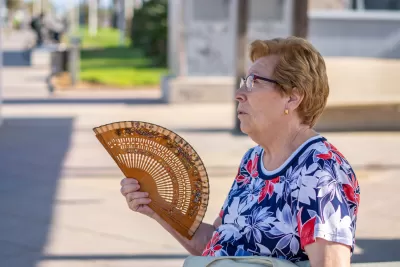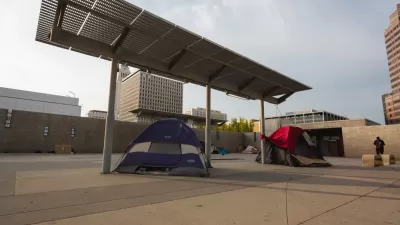Without the resources of larger cities, towns with fewer resources can still work to coordinate efforts across agencies and plan for heat events early in the year.

How can small towns that lack the resources of bigger cities prepare their agencies and residents to prepare for and respond to extreme heat events? Ysabelle Kempe explores the issue in Smart Cities Dive.
While some cities such as Phoenix and Houston have hired Chief Heat Officers tasked with leading cross-departmental efforts to address extreme heat events, others don’t have the funding to do so. In an interview with Smart Cities Dive, Ladd Keith, assistant professor of planning and sustainable built environments at the University of Arizona, said “Because heat is a relatively new climate risk compared to other climate risks, it’s not surprising at all to see that a couple silver bullet strategies have emerged because when you first learned about something, your knowledge is really limited.”
For Keith, one key strategy is coordination between various city and county departments, whether or not the city is able to hire a full-time climate or heat officer. For now, “I think where we’ve ended up is a lot of urban forestry efforts and a lot of focus on cooling centers.” Keith also recommends year-round planning for summer operations. “It’s not great to plan for cooling centers when it’s already hot and when it’s already summer because you’re going to have a little bit less effective coordination and missed opportunities with that.”
FULL STORY: Without chief heat officers, how can smaller cities respond to extreme heat?

Planetizen Federal Action Tracker
A weekly monitor of how Trump’s orders and actions are impacting planners and planning in America.

San Francisco's School District Spent $105M To Build Affordable Housing for Teachers — And That's Just the Beginning
SFUSD joins a growing list of school districts using their land holdings to address housing affordability challenges faced by their own employees.

The Tiny, Adorable $7,000 Car Turning Japan Onto EVs
The single seat Mibot charges from a regular plug as quickly as an iPad, and is about half the price of an average EV.

Seattle's Plan for Adopting Driverless Cars
Equity, safety, accessibility and affordability are front of mind as the city prepares for robotaxis and other autonomous vehicles.

As Trump Phases Out FEMA, Is It Time to Flee the Floodplains?
With less federal funding available for disaster relief efforts, the need to relocate at-risk communities is more urgent than ever.

With Protected Lanes, 460% More People Commute by Bike
For those needing more ammo, more data proving what we already knew is here.
Urban Design for Planners 1: Software Tools
This six-course series explores essential urban design concepts using open source software and equips planners with the tools they need to participate fully in the urban design process.
Planning for Universal Design
Learn the tools for implementing Universal Design in planning regulations.
Smith Gee Studio
City of Charlotte
City of Camden Redevelopment Agency
City of Astoria
Transportation Research & Education Center (TREC) at Portland State University
US High Speed Rail Association
City of Camden Redevelopment Agency
Municipality of Princeton (NJ)





























